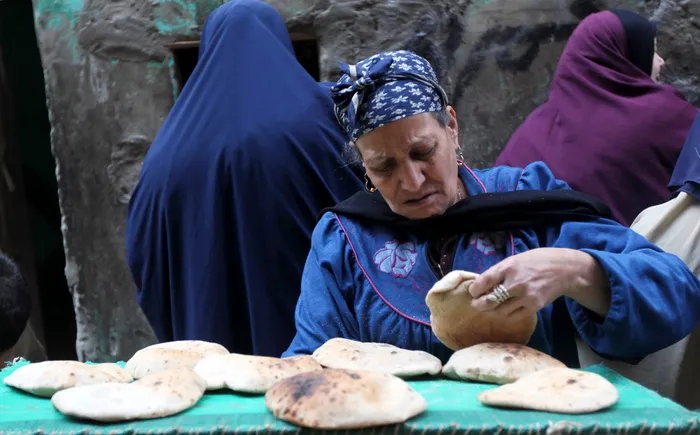Egypt’s Sisi has bigger problems than selling rockets to Russia

Picture: Mohamed Abd El Ghany/REUTERS/Taken March 17, 2013 – A woman chooses bread to buy at a bakery in Cairo. The spectre of steep food price inflation driven by a weaker pound is of particular worry to President Mohamed Mursi as he grapples with spasms of unrest two years after the uprising that toppled Hosni Mubarak. Ten years later, with half the 104 million strong population living in poverty Egypt’s president, General Abdel Fatah El-Sisi, has a serious food crisis on his hands with ever-mounting food inflation during the holy month of Ramadan, the writer says.
By Bobby Ghosh
You wouldn’t know it from this week’s headlines, but the most pressing question about Egypt is not whether General Abdel Fatah El-Sisi has been planning to arm Russia, but how he’s planning to feed his people. His regime is pushing back against a Washington Post report about a clandestine effort by Cairo to supply Moscow with munitions for use against Ukraine.
But the general can’t deny the far more serious crisis on his hands: Rampant food inflation is inflicting deep pain in the Middle East’s most populous country, where about half the population of 104 million people live near or below the poverty line.
On the day The Washington Post published its story, citing a leaked Pentagon intelligence document, Egypt’s state-run statistics agency reported that consumer prices rose an annual 32.7 percent in March, the fastest in almost six years. The rise was fuelled by a staggering 62.9 percent rise in food and beverage costs.
This is due in part to the lingering effects of Russia’s war against Ukraine: Egypt, the world’s largest importer of wheat, depends on both countries for grain. But the plunge in the Egyptian pound, which has halved in value against the US dollar over the past year, has supercharged the problem.
And there’s worse news to come: Analysts are predicting another big devaluation in the weeks ahead. Although Cairo has committed to moving to a flexible exchange rate, a pledge that helped to secure a $3 billion loan from the International Monetary Fund last year, authorities have been anxious to control the pound’s decline. Another devaluation would be the fourth since March 2022.
The timing is especially inopportune: We’re approaching the last week of Ramadan, the 40-day period when families traditionally splurge on new clothes, gifts and nightly fast-breaking feasts. Prices usually decline in concert with demand immediately after, but the anticipated relief for consumers will be short-lived if another devaluation is announced.
Nor can Sisi expect succour from Egypt’s historic sponsors among the Gulf Arab countries. Saudi Arabia, Qatar and the United Arab Emirates have made it clear that they will not pump money into the Egyptian economy to prop up the regime, as they have in the past. Like other investors, they too want to see where the pound settles before following through on promised investments. Like the IMF, they are holding Sisi to his promise to reduce the role of the military in the Egyptian economy, make the finances of state-owned companies more transparent and promote the private sector.
Where he previously begged for bailouts from the Gulf Arabs, he can now only plead for patience. To make his case, the general could point out that even the IMF now acknowledges Cairo may need to slow the pace of reforms to avoid damaging macroeconomic stability. A review of the Fund’s 46-month programme, scheduled for March 15, has been postponed.
The Gulf Arabs could conceivably also give Sisi some more time to get his economic house in order. But that may be the only break he can hope to catch. His officials, scrambling to find dollars elsewhere, have been reduced to desperate measures, such as the reintroduction of daylight-saving time next Friday – apparently in the hope that the resulting savings in energy will free up more natural gas for export.
Ordinary Egyptians, meanwhile, must brace for another spike in inflation as a result of a weakened currency. Food and drink amount to roughly a third of the monthly expenditure of the average family, and soaring prices are bound to deepen dissatisfaction with the regime.
Sisi needs no reminding that the last general who ran the country, Hosni Mubarak, was brought down by popular protests fuelled as much by food prices as by rampant corruption. Food inflation at the time of the 2011 Arab Spring was a mere 18.9 percent.
Rockets to Russia? The general would consider himself lucky if being caught selling them were his biggest problem.
Bobby Ghosh is a Bloomberg Opinion columnist covering foreign affairs. Previously, he was editor in chief at Hindustan Times, managing editor at Quartz and international editor at Time.
This column does not necessarily reflect the opinion of the editorial board or Bloomberg LP and its owners. This article was published on Bloomberg